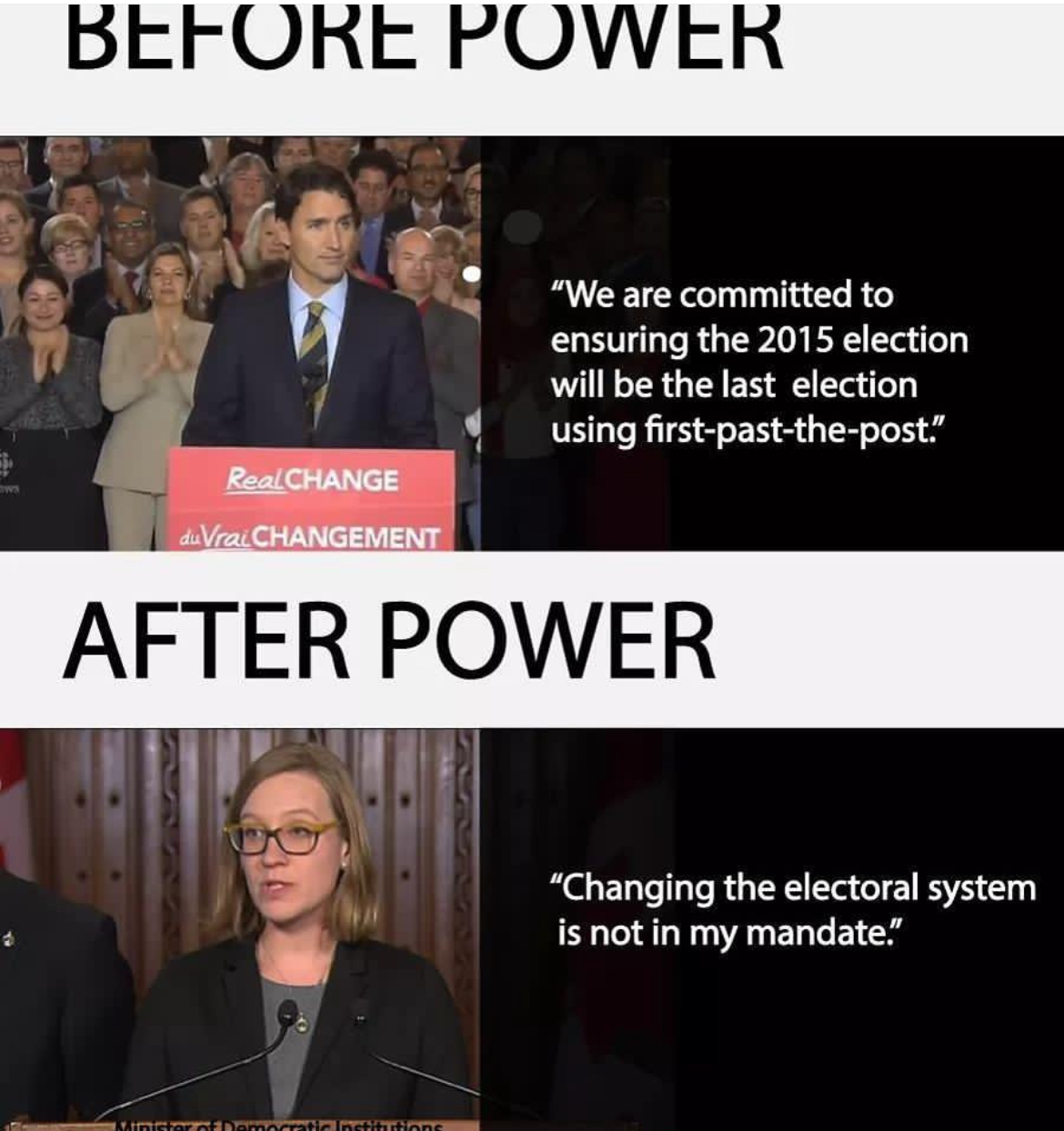Might work out, might not. It’ll be interesting to see more of the details.
One item I don’t see any of them talking about though, is addressing the regulatory hurdles around alternative banks offering more options when it comes to the underwriting and mortgage qualification. One common reason people are locked out of the housing market, is that they can’t qualify for a $1500/month mortgage, so they’re stuck paying $1700 rent instead, which is nuts. And the reason the banks – or more specifically smaller lenders who specialise in mid-market families (ie. Credit Unions) – can’t make these sorts of deals work, is that the regulatory bodies would smash them with huge penalties/fines due to it being considered “riskier” underwriting. Admittedly CUs are provincially regulated, but if we’re looking at it as a national issue then there should be broader discussion about these sorts of items amongst all tiers of govt – sorta like how health care is technically a provincial concern in segregation of power, but the feds have significant influence over it.
In times past, or more specifically in the 1980s where some of Carney’s ideas are coming from, there were more small Credit Unions doing mortgages outside the regular range of the federal banks – so if you were a ‘fringe’ borrower, you could still get your foot in the door, just with a different route than a traditional bank. This wasn’t a huge risk to the industry at large, as each of those CUs was small – if any had taken too many bad risks, it would be easy to let the organisation ‘fail’ and disperse its members over to new CUs. It’s less the case now, as the regulators have pushed CUs to merge into far larger organisations and shrunk the count of CUs industry-wide – meaning if something like Vancity went down, there’s no ‘safety net’ from other CUs able to absorb it and it’d inevitably hit the government books. And because of this, those same regulators force the system to be rigid and conform to explicit guidelines on their lending practices, with relatively minor wiggle room for boards/policies. Their efforts to minimize risk, choking the industry to death slowly, and removing financial supports from traditionally under-served demographic segments.
Like here’s an example that I know for a fact Credit Unions used to be able to offer to people, with some conditions/qualifiers: you could get a personal loan for a low rate to cover a big portion of the down payment on your mortgage. So if they felt like you could take on a bit more debt for the near term to get into a home, ie if they saw you paying $1700/month in rent and that your mortgage was gonna be just $1500, they could basically make that work with a far lower down payment.
Remember when the Liberals also unveiled their plan to make the 2015 election be the last under FPTP?

Is it weird to feel, well, maybe not optimistic but at least less pessimistic about a home maybe being affordable in the next 5-10 years?
(Admittedly, I do wonder how that would affect friends who scraped everything together to get something in the last few years.)
They are still living in that house instead of renting.
The only difference is that the house application won’t be theirs biggest savings plan.
It won’t happen unless using housing as a speculative assets is unprofitable.
Was housing an unprofitable speculative asset 20 years ago when housing was affordable?
Or, in your opinion, what changed in capitalism in the last 20 years?
What changed is 20 years of incomes falling behind inflation and more wealth consolidated into the asset owning class. Generational wealth got siphoned to the 1%, leaving millennials set back and gen-z to start with nothing and their labor undervalued to boot.
Capitalism progressed.
With this kind of housing plan, enough real assets might be injected back into the working class (and temporarily withheld from capitalists) to roll that imbalance back two or three decades. And we’ll have about that long before we find ourselves right back here again, unless we’ve finally mustered the global solidarity to tax capital and profit enough to sustain middle class wealth and pull up anyone below middle class who’s willing and ready to accept the aid. Or at the very least, drive wages much higher, for as long as capitalists are in fact still largely dependent on human labor.
Hopefully the big parts of Carney’s plan will be revenue-neutral (i.e. sell the houses at cost), lest next time around we find both the working class and the government wrung dry and leveraged out of options. Pessimistic as that outlook is, though, at least it buys us more time to finally agree robber barons were bad.
What changed is 20 years of incomes falling behind inflation
That wasn’t the case in Canada (or in the States I believe.) Real wages (wage growth accounting for inflation/CPI) increased every year until the pandemic. Even then, inflation outstripped wage growth but not by much:
https://www150.statcan.gc.ca/n1/pub/14-28-0001/2020001/article/00006-eng.htm
more wealth consolidated into the asset owning class. Generational wealth got siphoned to the 1%, leaving millennials set back and gen-z to start with nothing and their labor undervalued to boot.
Similarly, the timing doesn’t really line up for this. If you’ve read Piketty’s arguments about Capital in the 21st century, inequality has been taking off since the mid 70s. So maybe there’s some sort of tipping point but that seems a little odd.
But, we do both agree that this supply of homes is a good thing and worth fighting for, so that’s groovy!
According to the article you linked, there is no housing crisis, since our income has kept pace with cost of living. 🤨 I’m struggling to contradict that with hard data, but I don’t believe it for a millisecond. (Or to put it less argumentatively, I don’t understand how that data fits into the bigger picture.)
Anecdotally, I as a very early millennial was very lucky to get my first and current house during a brief window where I’d finally mustered the means and housing prices hadn’t yet completely galloped away. That was after over a decade spending more on rent than a mortgage would cost but next to nothing on transportation, and without having children, which was an economic non-starter even if I’d wanted them. (My partner and I did lots of cycling year round and bought a cheap utility vehicle before a house only because it was a prerequisite to accessing cheaper semi-rural housing.) If I could have gotten into a house 5 years earlier, I’d have about double the net wealth today. If my parents had been able to financially support me – heck, even just house me – through university, I’d have easily been able to do just that instead of graduating with what back then seemed like a tremendous student loan debt burden. It would be quaint today.
I view my place in history as straddling the tipping point of Canada’s cost of living (not just housing) crisis. I’ve since watched others in my same field but with a later start on life have basically no chance to advance. Their inflation-adjusted junior professional salary is similar to what mine was, but between student loans and exploding rent they’ll take even longer than I did just to be able to start saving for a down payment. By then…
I tried to source some proper data to more clearly demonstrate my point, but when it comes to charting historical trends, I don’t think Stats Canada could be more obtuse if they tried. So I’m falling back on this confluence of formula and policy changes to vaguely gesture in the general direction of my point:
- CPI calculation and budget recommendations that used to allocate shelter around 25% of income (early 80s) and now is at 30%
- household debt-to-disposable-income ratio: 110% in 1999, 127% in 2007, 173.1% in 2021
- various policy changes like reducing maximum amortization periods, the First-Time Home Buyer Incentive, or the Home Buyers’ Plan (a key reason I was able to buy a home), and the introduction of the CMHC itself – all housing market controls aimed at postponing increasingly infeasible home ownership and/or hedging against growing household debt risk
The time span I “repurposed” before wasn’t meant (by me) to indicate a tipping point of this wealth transfer. Rather I was ballparking that as how far this housing plan could roll back the trend (which is to say not all the way, and arguably the 70s isn’t the true beginning either). Saying income has fallen behind inflation may be technically false, yet each new generation is still starting with less while their predecessor’s wealth is/was siphoned into passive income for the investors backing mortgages and then buying the houses outright from retirees left with nothing to pass onto their children. Even if income is outpacing inflation, it’s still falling short of the rate at which speculators can out-compete new generations for assets.
Anyway, imperfect a solution as it is, I’m all for this housing initiative because a) regardless we need more housing and especially the type not being provided by the free markets, and b) it’ll disrupt the most egregious exploitation of the working class – the new generations with the least means starting out by paying high rent for the privilege of owning nothing and getting nowhere while the rich pad their war chests to snatch up even more of the finite assets.
Ahhh, I see the confusion. Inflation is generally excluded as a measure of inflation (which is super helpful in this context, otherwise you’d be in for a bit of circular reasoning.)
it’s still falling short of the rate at which speculators can out-compete new generations for assets.
This was always the case. It’s not like in the 90s or early 00s, home buyers could magically outbid those with deep pockets.
I’m not claiming housing is now affordable but nothing has really changed in the fundamentals of capitalism that would explain the rise of housing prices.
What has happened, imo, is that unsurprisingly, population growth outpaced home starts (poke around the housing start data yourself, it’s neat AND more home starts were of the type people didn’t intend to live in forever (apartments, which is why there’s now an odd glut of small condos in larger cities) AND land near desirable large cities became more scarce (do what you will, hard to increaelse the amount of land) prices rose quickly.
All this to say, it’s easy to blame speculators and the wealthy but it’s not a particularly convincing argument as those already existed in large numbers well before housing became unaffordable.
Anyway, glad we’re both for the housing initiative!
Anything that focuses on construction is the way to go.
This could do a lot of housing affordability. The question is will people with investment in housing allow for it to happen.
This won’t do shit for affordability, because the people with investment in housing will use their existing financial leverage to buy up all the new supply and either flip it at grotesquely inflated prices or rent it out.
This is like selling more tickets to a Taylor Swift concert; you’re just giving the scalpers more to work with.
You can’t solve hoarding by giving people more to horde.
It’s pretty hard to hoard something once there’s abundant supply.
It’s not like organizations and people with capital suddenly came into existence in the last 15 years…
I disagree. Scarcity is driving up home prices, which makes it more lucrative for corporations to move in and keep supply low and demand high. Flood the market with cheap affordable housing and it’ll push these asshole corporations out of the market.
You didn’t address the criticism.
The person was saying that if the investors buys up all the affordable housing. If it’s affordable for renters it will be affordable to investors.
Not directly, but the response is in there. Corps can buy up the houses (and easily if there’s no restriction on direct sales, which would be stupid). But they’ll be paying the mortgage and taxes whether they’ve got renters or not.
Once demand cools, they’ll start having to rent more competitively, and be among the first to start selling holdings that don’t rent lest they lose money on the resale after competitors flooded the market.
In my area, prudent property management businesses are already priced out by barely-wealthy individuals speculating on unbounded appreciation. On the assumption of that return – and not understanding the commitment, costs, and risks – they overbid for their chance to join the capital class, managing rental property as a side gig. They’ll be the first to fall, because they’re already just treading water or even running a deficit until either the mortgage is paid or some property incident renders them insolvent.
Thanks for breaking it down. But I think reducing the cost of housing would just increase margins and enlarge wiggle room enough for these mistakes to happen without too much trouble.
The just treading individual investor will lose money in the short term but the prudent investor can wait for new cheaper housing to make the math work out.
Lowering the cost of housing will also mean more individual landlord wannabees will be able to enter the market. You can’t time the market but with the Government telling what is going to happen, smart people will wait on their capital. That capital is what I fear. I would like the PM to force that investment into productive businesses as opposed to Real Estate. So Real Estate belongs to the occupier. Furthermore I’d like to pay my own mortgage, not my landlord’s. But we’ll see what happens.
While I’m pretty much just guessing that closing the supply gap will on its own force the market to compete rather than pad their margins, the obvious additional step would be having the public developer sell only to individuals/families that own no other property. Even if it isn’t feasible to mandate the same for secondary sales, that would still sap rental demand. Plenty of young people (and older generations stuck in a poverty cycle or unable to map a retirement) would choose home ownership over the chance to flip a starter home for profit and then keep renting or gamble on upsizing while forces conspire to cool the market.
I can’t recall for sure, but I think at some point Carney specifically mentioned developing small starter homes. That’ll sap demand for the larger, more expensive homes that previously had no alternatives, and be a very inefficient property to manage. (Individuals will still speculate if allowed, and their financial blunders would likely add some downward pressure as well, though not as much as reducing rental demand.)
Overall, there certainly are some counterbalancing forces that would prevent housing prices from going down significantly, and I suspect that’s also intended or at least included in projections. Carney is still a true blue neoliberal, and he’s not looking to upset the asset holding class. I’d wager his target is continued appreciation but at a rate near or below general inflation.
I think you bring up a good point about capital holding back to buy a dip. The answer to that is probably enticing those dollars into other investments around further extraction, new manufacturing, and (maybe) R&D. The last one probably won’t draw that much private interest though – it’s too high a risk when the economy isn’t booming overall.




